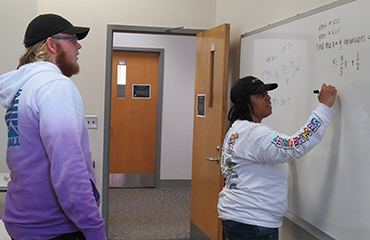
The P.A.S.S. program begun in the fall by Lander's Academic Success Center (ASC) is having a positive impact on the university's efforts to retain students.
P.A.S.S., an acronym for Peer Assisted Study Sessions, is modeled after the supplemental instruction program developed by the University of Missouri at Kansas City. It brings together students who excel in a subject and students needing help with it.
Extra help is offered in classes based on the "DFW" rate, a reflection of the students who took the courses in the past and made either a 'D,' an 'F,' or withdrew. The lineup in the fall included courses in nursing, chemistry, math, biology, political science and history.
The supplemental instruction offered during a particular semester is also determined by the logical sequence of classes. For example, in the spring, the focus will be on Biology 112 instead of on Biology 111.
Data collected by the ASC suggest that the P.A.S.S. program is off to a good start. Of the 314 students who participated in the program during the fall, 79 percent made either an 'A,' a 'B,' or a 'C' in the class they sought help in.
Tutoring and Supplemental Instruction Coordinator Anissa Lawrence, who oversees the program for the ASC, said that she has received positive feedback from faculty members whose students took part in P.A.S.S.
"For Nursing 232, Dori Dahlberg teaches that, and she told me that this is the first time since she started teaching that class that she had a 100 percent pass rate. She was very excited," Lawrence said.
According to Lawrence, students who participated in P.A.S.S. during the fall made higher grades than students who opted for one on one tutoring, a difference she attributed to the P.A.S.S. program's small group settings and collaborative learning strategies.
Another reason for the success of the program is the cooperation between the professor who teaches a class and the peer leader who offers help in it. Peer leaders attend lectures the same as other students, and plan activities based on their observations and the recommendations of the instructor.
The peer leaders' mastery of the material is motivational for the students they assist, according to Lawrence. "Leading by example," she calls it.
P.A.S.S. is currently referred to as a pilot program, and that will continue to be the case through the spring. "We're still learning and making adjustments to the program," Lawrence said. "Making it bigger and adding more subjects" is one of the changes she would like to make.
The long-term goal is gaining certification as a supplemental instruction campus. "It's probably going to take us four to five years to get there, because you have to have three years of solid data," she said.
The program's first semester could be considered "very successful. The students who have attended have said it's been helpful, that they benefited from it," she said.